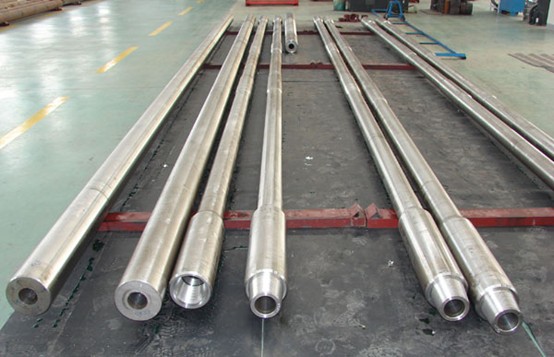Drill collars are a critical component of the drill string, serving as industrial-grade tubular equipment primarily used to provide weight on the drill bit, thus facilitating deep drilling. Typically working in conjunction with drill pipes, drill collars come in two main types: smooth and spiral-grooved. Well-engineered drill collars are designed to deliver reliable performance and durability under harsh drilling conditions.
Material Selection and Importance
The choice of material in manufacturing drill collars is essential, as it directly impacts the product’s durability and performance. The main materials used for drill collars include AISI 4145H, modified 4145H, and non-magnetic alloys.
- AISI 4145H: This high-strength alloy steel is widely favored for its excellent mechanical properties, including superior strength, toughness, wear resistance, and corrosion resistance. AISI 4145H can withstand the high stress and torque loads encountered during drilling operations, making it a reliable material choice for demanding environments.
- 4145H Modified: An enhanced version of AISI 4145H, this modified alloy offers improved mechanical properties, providing even greater stress and torque resistance. This makes it ideal for more challenging operational conditions.
- Non-Magnetic Materials: In certain drilling applications—especially those involving sensitive equipment like directional drilling tools and downhole instruments—non-magnetic materials are crucial. Non-magnetic drill collars are designed to minimize interference with magnetic surveying equipment, ensuring accurate directional drilling. Typically made from specialty alloys with low magnetic permeability, these collars offer minimal magnetic interference while maintaining the structural strength required for the drilling process. Non-magnetic drill collars also feature excellent torque capacity and ideal straightness, allowing for efficient transmission of weight and rotational power to enhance drilling efficiency.
Types of Drill Collars and Their Features
Different types of drill collars are available to suit specific drilling needs:
- Smooth Drill Collars: These collars feature a chrome-plated, smooth outer diameter, which reduces torque and prevents damage as the collar passes through the wellbore. The hard chrome plating also enhances corrosion resistance, thereby extending the collar’s service life.
- Spiral-Grooved Drill Collars: The spiral groove design allows for faster fluid circulation, aiding in effective hole cleaning. The flutes create wider fluid channels that quickly clear cuttings and prevent clogging, helping to maintain an unobstructed wellbore.
- Non-Magnetic Drill Collars: Specifically designed to reduce interference with magnetic surveying tools, non-magnetic drill collars help ensure accuracy in directional drilling. These collars, crafted from alloys with low magnetic permeability, not only minimize magnetic interference but also maintain the strength required to endure the stress of horizontal, directional, and extended-reach drilling operations. Their exceptional torque handling and straightness characteristics make them highly reliable in complex drilling applications.
Drill collars are manufactured to meet rigorous design standards and are built from high-quality materials, ensuring dependable and efficient performance in the most demanding drilling environments.
Post time: Nov-22-2024





